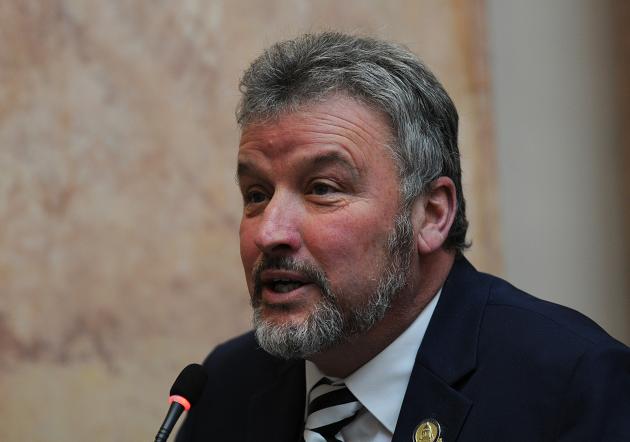Resolution ending COVID-19 state of emergency heads for governor’s desk
FRANKFORT— Two years after the first confirmed case of COVID-19 in Kentucky, the COVID-19 state of emergency may soon be coming to an end.
The Kentucky House of Representatives adopted Senate Joint Resolution 150 on Thursday by a 75-20 vote. The Kentucky Senate adopted the measure on Feb. 24 by a 28-8 vote.
If signed into law by Gov. Andy Beshear, the resolution would immediately end Kentucky’s COVID-19 state of emergency. If he vetoes the measure, the Kentucky General Assembly could still vote to override his decision.
The primary sponsor, Sen. Donald Douglas, R-Nicholasville, filed the resolution on Feb. 18 with the intention of it taking effect on March 7.
Rep. Thomas Huff, R-Shepherdsville, presented SJR 150 on the House floor on behalf of Douglas. Huff said the resolution is “long overdue.”
“The question we really need to ask ourselves is, are we really in a state of emergency?” Huff said. “Are the hospitals overflowing? Are the deaths skyrocketing? Are the numbers climbing? That is the question we need to ask, not whether we can squeak by another month on free federal money.”
SJR 150 would also require the governor to ask for the General Assembly’s approval before declaring another COVID-19 emergency.
During debate, a couple of lawmakers expressed concerns about the impact the resolution might have on federal funding and the Supplemental Nutrition Assistance Program known as SNAP.
Rep. Cherlynn Stevenson, D-Lexington, said the federal COVID-19-related funds are helping hospitals retain staff and helping keep local economies afloat.
“We have a shortage of nurses, and a lot of the federal dollars that have come in are helping with the fact that we have travel nurses that claim a lot of dollars per hour to be here,” Stevenson said. “… The SNAP benefits that are coming as a result of this emergency, it was about $52 million a month.
“I do also have to think about the fact that those dollars have come in to our economy, and we have many local grocery stores and farmers that all of a sudden $52 million a month being gone from a system that allows people to purchase food from our grocers and our farmers is really going to be sorely missed.”
Rep. Kimberly Poore Moser, R-Taylor Mill, and Rep. Norma Kirk-McCormick, R-Inez, said the research they’ve done on the SNAP program shows that ending the state of emergency will not take away benefits from those who truly need it and qualify for the program, with or without the state of emergency.
In explaining her no vote, Minority Floor Leader Joni L. Jenkins, D-Shively, said since many Kentuckians are still struggling to return to work due to lack of childcare options.
“If (the state of emergency) would give us another month or two to get (childcare) back and going, I think it is worth it to receive those federal dollars from California and New York to keep our economy going,” Jenkins said.
Rep. Savannah Maddox, R-Dry Ridge, said she agrees that ending the COVID-19 state of emergency is overdue.
“(The economic shutdown) has led to rapid inflation and all kinds of socio-economic issues that we are going to be contending with for years, so I’m glad that we are ending the state of emergency,” Maddox said. “It’s no secret that I wish that we would have ended it much sooner.”
SJR 150 will now head to the governor’s desk for his signature or veto.



























